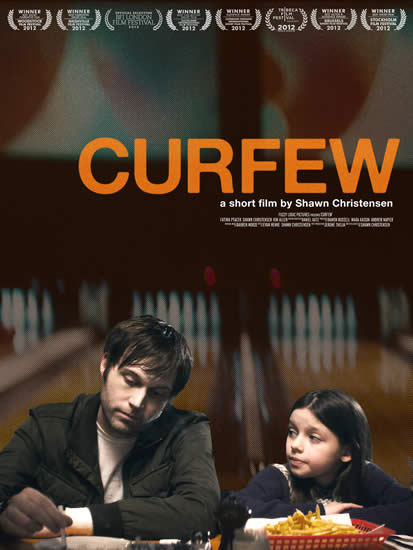 In Curfew, a film by Shawn Christensen, nominated for the Academy Awards Best Live Action Short Film, at the lowest point of his life, Richie gets a call from his estranged sister, asking him to look after his nine-year old niece, Sophia, for the evening.
In Curfew, a film by Shawn Christensen, nominated for the Academy Awards Best Live Action Short Film, at the lowest point of his life, Richie gets a call from his estranged sister, asking him to look after his nine-year old niece, Sophia, for the evening.
SHAWN CHRISTENSEN graduated from Pratt Institute with a BFA in Illustration and Graphic Design. After graduating, he formed indie rock band Stellastarr* and, while on tour, wrote and sold many screenplays, including Sidney Hall (Scott Free Productions) and Karma Coalition (Warner Bros.). His short film Brink, was an Official Selection of the 2011 Tribeca Film Festival and won “Best Festival Film of the Year” by ShortOfTheWeek.com. His latest short film, Curfew, has won over 40 awards in Film Festivals around the world and is currently nominated for Best Live Action Short Film for the 85th Academy Awards.
Bijan Tehrani: How did you come up with the idea of Curfew?
Shawn Christensen: I had met this girl who lived next door to a friend of mine, who was about nine years old. It was apparent that she had a bit more common sense than I did and a bit more knowledge about life – some things about life, so I started developing the idea for me as an actor… You know. I’d play the uncle and she’d play the niece… I didn’t do anything with it for years. And then coming in 2011, I started feeling very personally affected by certain issues you see in the film, I was in a very dark place and I started coming up with the idea of this guy who’s at the very low end of his rope, and this girl who’s arguably at a very high point in her life, and to bounce them off each other for the film. That was what intrigued me to go ahead and just direct it myself.
BT: One thing that is very interesting in the film is the very strong performances. Tell us about that.
SC: That was the thing I wanted to make sure I nailed because that’s what I have the most fun doing, the fun part for me watching films is watching the performances. It’s important: if you don’t have a good performance, the whole thing falls flat. So one, we needed to find a ten-year old girl who was able to do it – and Fatima was more than able, she was beyond whatever we expected – and two, I wasn’t so sure about myself. I had to make sure I got in the head of the character I was doing. Also, when we were filming, we did some takes that were more dramatic and others that had a little bit more humor. That way, I’d be able to cover myself later in the editing room when I was hating all my performances, I could at least say, “let’s go to the lighter one.”
BT: How did you come up with the visual style of your film?
SC: My D.P., Daniel Katz, and I sat down and we both adore Panavision anamorphic photography, Daniel had a friendship going with Panavision, but our problem became, if we were to shoot anamorphic, we didn’t want it to look vast and beautiful and epic; we wanted it to look grainy, gritty and a little dirty to represent that side of New York City. So we sat down and watched a bunch of films that were anamorphic but also had this earthy quality to them, and we just started making notes on how we could achieve that.
BT: Is there a filmmaker you can name as someone who influenced you?
SC: There are many filmmakers that have influenced me and I suppose I go into streaks. I’d say the top ones for me are Ingmar Bergman, Woody Allen, P.T. Anderson, Kubrick but I also appreciate our contemporaries. David Fincher I think is a true artist… There’s a whole load of directors who influence me but sometimes I’ll go through streaks of watching their entire catalogue. Sometimes I’ll go on a Hitchcock streak, I’ll watch like forty of his films, which is probably only half of what he did!
BT: How do you see your chances of winning the Academy Award for Best Live Action Short?
SC: I have no idea. All the films are so different. I almost think it comes down to a matter of taste. I imagine someone who likes Curfew not liking any other one, or someone liking another one not liking Curfew.. I feel it just comes down to taste and they’re all so strong! I have no idea.
BT: How much has the nomination helped you as a filmmaker or will help you?
SC: “Will help” is I think the key word. What I’m trying to do is go from somewhere where I’m considered a screenwriter into a territory where I’m considered a director. This transition is probably going to be a little bumpy for me regardless of the nomination. It’s a matter of people believing in what I’m doing and me believing in what they’re doing, and seeing if we can get together and help each other – maybe I can help them make money with my movie and they can help me get my movie made.
BT: What are your future plans?
SC: My immediate future plans… After the Oscar, my future plan is going to be to sleep! That will be the first thing I do! After that, I have a feature version of Curfew that we’re offering financiers right now but we plan to shoot that soon if we get the money. And then I have another specs screenplay that’s a much bigger movie that I’m very proud of. I want to direct it and have control over it, so I’m going to shoot a smaller version like Curfew first, so that I can plop myself in a position to make a bigger movie.
BT: Great, thank you! I wish you luck and success in your work.

